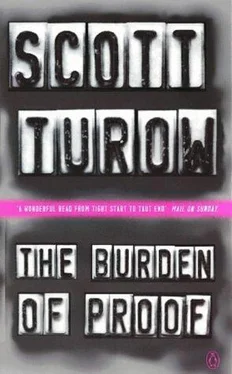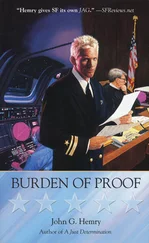Scott Turow - The Burden of Proof
Здесь есть возможность читать онлайн «Scott Turow - The Burden of Proof» весь текст электронной книги совершенно бесплатно (целиком полную версию без сокращений). В некоторых случаях можно слушать аудио, скачать через торрент в формате fb2 и присутствует краткое содержание. Жанр: Детектив, на английском языке. Описание произведения, (предисловие) а так же отзывы посетителей доступны на портале библиотеки ЛибКат.
- Название:The Burden of Proof
- Автор:
- Жанр:
- Год:неизвестен
- ISBN:нет данных
- Рейтинг книги:3 / 5. Голосов: 1
-
Избранное:Добавить в избранное
- Отзывы:
-
Ваша оценка:
- 60
- 1
- 2
- 3
- 4
- 5
The Burden of Proof: краткое содержание, описание и аннотация
Предлагаем к чтению аннотацию, описание, краткое содержание или предисловие (зависит от того, что написал сам автор книги «The Burden of Proof»). Если вы не нашли необходимую информацию о книге — напишите в комментариях, мы постараемся отыскать её.
The Burden of Proof — читать онлайн бесплатно полную книгу (весь текст) целиком
Ниже представлен текст книги, разбитый по страницам. Система сохранения места последней прочитанной страницы, позволяет с удобством читать онлайн бесплатно книгу «The Burden of Proof», без необходимости каждый раз заново искать на чём Вы остановились. Поставьте закладку, и сможете в любой момент перейти на страницу, на которой закончили чтение.
Интервал:
Закладка:
Lord, what a thug he was, Stern thought when he remembered Marvin.
Gum-cbewing,' wisecracking, with little black eyes and, as they said on the street, an attitude. Marvin was a wrong cop from the day he got his star. And a daily heartache to Ray here, who took over Marvin's guidance when the father passed away.
Almost a dozen years ago, certain police officers, disgruntled by the usual departmental rivalties, had begun to assemble evidence of wrongdoing in the city's North Branch district. This effort required no intrepidhess. The North Branch was wide open: cops on the pad; bail bondsmen steering cases; judges on the take. Marvin was not the worst offender, but one of the least popular, and at the time he first met Stern he had a subpoena to appear before a state grand jury that was looking into allegations that Marvin had taken monthly payments from certain narcotics dealers to warn them of ensuing police raids.
"I still owe you for all of that;" said Radczyk.
Stern shook his head. It had not been much. He had simply touched the pressure points. Like someone who knew jujitsu.
Stern had paid discreet visits to certain politicians whose alliances he'd estimated would be disturbed by sudden havoc in the North End. The county prosecutor, Raymond Horgan, who had friends like everybody else, had seen fit to quash the investigation. For these efforts, Radczyk had been unreasonably grateful; he had attended each of Marvin's visits, fretting like a mother; he was as garrulous then as now. Marvin simply sat there in his uniform, cracking his gum, while Ray went on reinterpreting every remark and arguing in behalf of Marvin's exculpation. He seemed determined not to believe the worst, the kind of devoted big brother every man should have. None of it had done any good for Marvin, who was discovered a few years later in the trunk of a car being towed from a parking lot in the North End. As Stern heard it,'
Marvin was stark naked, with blowtorch holes burned black through his privates.
Stern said that out loud, that he might not have been much help to Marvin in the end.
"Gave him a chance," said Radczyk. "He was three times seven. Can only give a leila a chance." Stern and he both pondered that observation. "I shoulda known he'd never make a cop. Hell," said Radczyk, "I don't even know what kind of cop I made." Radczyk, caught in his own tender reflections, smiled crookedly. There was something unavoidably touching about this confession-the very plainness of it. Radczyk was pushing retirement but remained in doubt about these fundamental judgments. His woe Stern did not feel; he had no question about his fitness for his calling, no regrets about what he would have done with greater diligence or harder work. It was the costs of that kind of dedication he was now attempting to assess. The thought brought him back to where they had started. Glancing about to find his cases, Stern stood.
"I thank you for all your good work on this matter, Lieutenant. I am in your debt."
Still apparently anchored in the past, Radczyk considered Stern with a tentative, sad amp;ned look and for the first time had no comment.
"Did my wife have a virus, by the way?" Stern asked. He wondered how remote the glimmer was that he had been chasing.
In answer, Radczyk showed the paper. His thick finger lay in the findings section of the form. Stern squinted across the table: "HSV-2 Positive." When Stern looked to him inquiringly, Radczyk shrugged.
Whatever that meant. Medical gibberish.
"Maybe I oughta go back there and get that doc's name for you," said Radczyk.
This time Stern caught it, a, savvy flash that passed through Radczyk's worn cheerful face, sharp and sudden as the reflection off a blade-something you see, then don't.
He had seen this clever gleam in Radczyk before, Stern realized, and let it go by. It amazed him, after all these years, that he could still be taken in by the police.
Stern set down his cases and resumed his seat. He spOke precisely, as he would in court,
"You must excuse me, Lieutenant, but I believe you did not answer my question."
Radczyk's happy mug took on an oafish expression. Caught, he looked both ways and weighed something, probably an impulse to try another feint: What question? He did not do that.
"Yea, verily," said Radczyk at last- "I did not."
"What was this test for?"
"Oh," said Radczyk. He pushed the few clumped strands of hair over his red scalp. "That's what the doctor should be telling you, Sandy. I'd rather not."
"I see. Are you refusing?"
The pOliceman looked around, big and unhappy.
"No, I ain't refusin' you, Sandy. You ask, I'll tell ya the truth."
"Well, then?"
Radczyk's old face was soft and drained.
"Herpes," Radczyk said.
"Herpes?"
"I asked the lady. That's what she told me. Herpes."
Radczyk passed his hand over his mouth, wiping it in a fashion, and said, "Genital herpes."
Stern found himself pondering the dirty river, the flecks of wood pulp, disintegrating cardboard, whitish foam that floated by. He had felt just this way recently, he thought with idle precision. When was it?
Then he remembered opening the door to the garage. Peering down, he noticed that one of his hands was gripping the dirty gray table by the edge.
"The test was positive?" he asked. Of course, he knew what the paper had said.
"Sandy, you're askin a guy who don't know a thing. I'm repeating what the lady told me. Who knows? Who knows what we're talkin about? I'm goin right back there. I'm gonna get this doc's name, I'll have it for you in no time fast."
"Please do not bother, Lieutenant."
"No bother."
"You have done enough." Of course, it came out the wrong way. stern stood there, reeling, suffering, unable just now to do anything to make amends.
My God, Clara, he thought.
Stern insisted on paying the check. He grabbed the old policeman's rough hand and shook it solemnly, and Rad-czyk, in some kind of conciliatory gesture, took the copied page and placed it in the pocket of Stern's suit. Then Mr. Alejandro Stern, with his empty cases, turned to go, wondering where so early in the day he could find a place to be alone.
PART
Clara Mittler was already too old when she met him. It was 1956.
Their acquaintance was first struck in the auspicious climate of her father s law office, where Stern had let one room in Henry Mittler's suite. In those years Stern revered Henry; by the end, he saw his father-in-law as a man with too little justice in him to be admired. But in 1956, with his large and sometimes volcanic personality, and, more pertinently, his influence and wealth, Henry Mittler loomed before Stern, fresh from Easton Law School, like some diorama giant, a majestic emblem of the attainments possible in a life at the bar. He was.a sizable fellow, with a formidable belly and whitish hair pushed straight back from a widow's peak, distinct as an arrow, and his manner was, by turns, shrewd and scholarly and ruthless. In many ways, Henry was the most refined of gentlemen; he collected stamps, and for many years thereafter Stern would watch with amazement as Henry, with his jeweler's glass and tweezers, studied, stored, and filed. In other moods, he was a person of utter commonness. Whatever his temper, he projected the imposing aura of an orchestral maestro, This impressive congregation of qualities-and, as Stern learned later, a fortunate marriage to a woman of significant standing-had made him a business counselor whose insight and discretion were prized throughout the city' s small but wealthy German Jewish community. Two of the larger independent banks downtown were his clients; so were the Hartzog and Bergstein families, only then conquering the first terrains in their future kingdoms in air travel and hostelry. Henry had come of age in an era when those he served stood for sweatshops and union busting and heartless home foreclosures-the entire pristine empire of wealth, accepted as being in the Order of Things. It was a different world now;
Читать дальшеИнтервал:
Закладка:
Похожие книги на «The Burden of Proof»
Представляем Вашему вниманию похожие книги на «The Burden of Proof» списком для выбора. Мы отобрали схожую по названию и смыслу литературу в надежде предоставить читателям больше вариантов отыскать новые, интересные, ещё непрочитанные произведения.
Обсуждение, отзывы о книге «The Burden of Proof» и просто собственные мнения читателей. Оставьте ваши комментарии, напишите, что Вы думаете о произведении, его смысле или главных героях. Укажите что конкретно понравилось, а что нет, и почему Вы так считаете.












